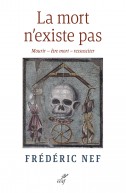
L'Ombre de la nature
Collection Passages
224 pages - mai 2009
38,50€
La philosophie est née d'un premier regard interrogateur tourné vers la nature et, dès l'origine, elle se voulait science de la nature. Mais à la suite de la révolution de la pensée au XVIIe siècle, la science a pris les devants. Elle a redéfini la nature, qui a cessé d'être le substrat immuable de tout ce qui existe. Forte du langage mathématique qu'elle privilégie sur les autres voies d'accès à la nature, la science affirme son aptitude à métamorphoser des qualités naturelles et même à les engendrer. Au lieu d'un fondement dernier, surgit la capacité de la nature à se renouveler selon des formes que rien ne laissait prévoir, provoquées par notre intervention. En même temps que son champ d'action s'est étendu, la nature, si abstraite soit-elle, est devenue décidément humaine. C'est une humanité inquiétante, où l'harmonie de jadis est remplacée par le désordre, le contingent, l'effondrement. Or, la maîtrise de cette instabilité s'alimente au trouble que la science a elle-même créé : elle n'a plus affaire au réel que par l'intermédiaire d'un imposant dispositif symbolique, et les symboles mathématiques ont fini par prendre la place du réel ; ils sont l'ombre d'une nature dont on ne sait plus rien de la lumière irradiée au commencement. C'est justement parce que la science s'est accaparé ces potentialités de réflexion traditionnellement dévolues à la philosophie qu'une nouvelle reprise philosophique du concept de nature s'avère nécessaire. Inlassablement le tourment d'une vaste Nature vient rappeler toutes les formes de savoir à leur origine dans le monde qui semble aller de soi. Le monde naturel au premier contact est finalement la plus grande énigme que nous lègue aujourd'hui la science. La Nature ainsi reprise dépose une ombre, réfractée tout à la fois dans le désir de savoir et dans sa perpétuelle insatisfaction.
--
Philosophy was born of a first questioning look at nature; and from that beginning, its ambition was to be a science of nature. But after the 17th century revolution in thinking, science took the lead. It redefined nature, which is no longer the perpetual essence of all that exists. Strengthened by the mathematical language it favours above other approaches to nature, science claims its aptitude to metamorphose natural qualities and even to engender them. Instead of being an ultimate foundation, what emerges is nature’s capacity to renew itself in ways we could never have foreseen, created by our intervention. As its domain of action spread, nature, however abstract, became decidedly more human. But it is a disturbing humanity, where former harmonies are replaced by disorder, the accidental, collapse. The control of that instability is nourished by the malaise that science itself has created: it is no longer related to reality except through the intermediary of an impressive symbolic system; the mathematical symbol has taken over from the real, the shadow of a nature that has lost the radiant light of its origins. It is precisely because science has taken over the potential reflection that was, traditionally, handed down to philosophy, that a new philosophical take on the concept of nature has become imperative. Incessantly, the vast torment of Nature calls upon all forms of knowledge to reclaim their original place in the world. Our very first perception of what is natural is ultimately the greatest enigma that science bequeaths to us. In this light, Nature casts a dual shadow: the desire for knowledge and its perpetual dissatisfaction.
--
Philosophy was born of a first questioning look at nature; and from that beginning, its ambition was to be a science of nature. But after the 17th century revolution in thinking, science took the lead. It redefined nature, which is no longer the perpetual essence of all that exists. Strengthened by the mathematical language it favours above other approaches to nature, science claims its aptitude to metamorphose natural qualities and even to engender them. Instead of being an ultimate foundation, what emerges is nature’s capacity to renew itself in ways we could never have foreseen, created by our intervention. As its domain of action spread, nature, however abstract, became decidedly more human. But it is a disturbing humanity, where former harmonies are replaced by disorder, the accidental, collapse. The control of that instability is nourished by the malaise that science itself has created: it is no longer related to reality except through the intermediary of an impressive symbolic system; the mathematical symbol has taken over from the real, the shadow of a nature that has lost the radiant light of its origins. It is precisely because science has taken over the potential reflection that was, traditionally, handed down to philosophy, that a new philosophical take on the concept of nature has become imperative. Incessantly, the vast torment of Nature calls upon all forms of knowledge to reclaim their original place in the world. Our very first perception of what is natural is ultimately the greatest enigma that science bequeaths to us. In this light, Nature casts a dual shadow: the desire for knowledge and its perpetual dissatisfaction.
- Dimensions : 145x235x12
- ISBN : 9782204088343
- Poids : 340 grammes






